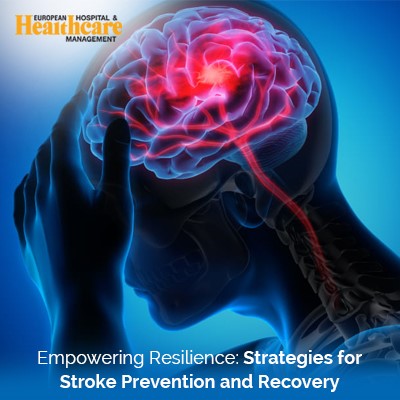"Empowering Resilience: Strategies for Stroke Prevention and Recovery" explores medical advancements, lifestyle interventions, technology's role, rehabilitation techniques, and ethical considerations in stroke care. It delves into innovative approaches, psychological support, caregiver empowerment, and emerging trends, envisioning a future where stroke prevention and recovery are optimized for resilience.

Stroke, a leading cause of disability and death globally, strikes with suddenness and severity, often leaving survivors and their families grappling with immense challenges. However, in recent years, significant strides have been made in understanding stroke prevention and enhancing recovery outcomes. This article delves into empowering strategies for stroke prevention and recovery, exploring advancements in medical science, lifestyle interventions, rehabilitation techniques, and the crucial role of support systems in fostering resilience.
Causes and Risk Factors Before delving into prevention strategies, it's vital to understand the mechanisms and risk factors associated with stroke. Stroke occurs when blood flow to the brain is interrupted, either due to a blockage (ischemic stroke) or a burst blood vessel (hemorrhagic stroke). Common risk factors include high blood pressure, diabetes, smoking, obesity, and a sedentary lifestyle. Age and family history also play significant roles in stroke susceptibility.
The advent of modern medicine has ushered in groundbreaking approaches to stroke prevention. One notable advancement is the development of medications that target specific risk factors, such as antihypertensives for blood pressure control and anticoagulants for preventing blood clots. Additionally, innovations in surgical techniques, such as carotid endarterectomy and stenting, have significantly reduced the risk of stroke in high-risk individuals.
Lifestyle Interventions for Stroke Prevention Beyond medications and surgeries, lifestyle modifications play a pivotal role in preventing strokes. Adopting a healthy diet rich in fruits, vegetables, whole grains, and lean proteins can lower cholesterol levels and reduce the risk of hypertension and diabetes. Regular exercise not only strengthens the cardiovascular system but also helps maintain optimal weight and blood pressure. Smoking cessation and moderation in alcohol consumption are also crucial lifestyle changes for stroke prevention.
Technology has revolutionized stroke prevention strategies, particularly in the realm of remote patient monitoring and early detection. Wearable devices equipped with sensors can track vital signs, detect irregularities in heart rhythm (a common precursor to stroke), and alert healthcare providers and patients in real time. Telemedicine platforms enable timely consultations, medication adjustments, and lifestyle counseling, enhancing stroke prevention efforts, especially in underserved areas.
Rehabilitation and Recovery For those who have experienced a stroke, the journey to recovery can be arduous but not insurmountable. Rehabilitation plays a central role in empowering stroke survivors to regain lost functions and improve quality of life. Physical therapy focuses on restoring mobility, strength, and coordination, while occupational therapy helps individuals relearn daily tasks and adapt to functional limitations. Speech therapy addresses communication difficulties, and cognitive rehabilitation enhances memory, attention, and problem-solving skills.
Recent years have witnessed the emergence of innovative approaches in stroke rehabilitation, leveraging technology and neuroplasticity principles. Virtual reality-based therapies offer immersive environments for motor and cognitive training, promoting neurorehabilitation through engaging and tailored exercises. Robotics-assisted therapy provides precise movements and feedback, facilitating intensive and targeted rehabilitation sessions. Brain-computer interfaces hold promise in restoring communication and motor control in severely affected individuals.
The emotional impact of stroke on survivors and their caregivers cannot be overstated. Depression, anxiety, and post-stroke psychological challenges are common and require compassionate support and specialized mental health care. Psychologists, social workers, and support groups play vital roles in addressing mental health needs, offering coping strategies, fostering resilience, and promoting social connections, which are integral to holistic recovery.
The Role of Caregivers and Support Systems In the journey of stroke recovery, caregivers are unsung heroes, providing physical, emotional, and logistical support to survivors. Recognizing the pivotal role of caregivers, support systems have evolved to offer comprehensive assistance and resources. Respite care, caregiver education programs, and community support networks empower caregivers, prevent burnout, and enhance the overall well-being of both survivors and caregivers.
Looking ahead, the landscape of stroke prevention and recovery continues to evolve with promising trends and innovations. Precision medicine approaches, leveraging genetic profiling and biomarkers, hold the potential for personalized risk assessment and targeted interventions. Advances in neurostimulation techniques, including transcranial magnetic stimulation and deep brain stimulation, offer novel avenues for enhancing neural recovery and function. Furthermore, the integration of artificial intelligence and big data analytics is poised to revolutionize stroke care, enabling predictive modeling, treatment optimization, and outcomes research.
Amidst these advancements, ethical considerations loom large, highlighting the importance of equity, informed consent, privacy protection, and responsible use of data in stroke care. Ensuring access to cutting-edge treatments and rehabilitation services for all socio-economic groups, addressing disparities in healthcare delivery, and upholding patient autonomy and dignity are paramount ethical imperatives.
Empowering resilience in stroke prevention and recovery encompasses a multifaceted approach, integrating medical breakthroughs, lifestyle modifications, technological innovations, rehabilitative strategies, psychological support, caregiver empowerment, and ethical principles. By harnessing the collective efforts of healthcare providers, researchers, policymakers, caregivers, and communities, we can strive towards a future where strokes are prevented, outcomes are optimized, and survivors thrive in their journey of resilience and recovery.